By Tom Anderson and Eliza Egret. Many thanks to Amy Hall and Lydia Noon for their help with the interview.
This is the first in a series of interviews with Palestinians from Area C who have experienced demolitions of their homes or property carried out by the Israeli occupation authorities. In our interviews we will show some of the effects of demolitions, and highlight the companies involved in carrying them out.
We meet Atta Jaber with his family on their land in the Baq’ah Valley, near Hebron. From the house we can clearly see the illegal Israeli colony of Kiryat Arba, which lies just three hundred metres away, across the highway.
When we arrive, Atta and his brother’s family are working in a field below his house while F16s fly overhead. Atta confirms that this happens all day long, “24 hours a day. The Middle East is under Israeli attack. How many times this year have they attacked Syria?”
After offering us coffee, we walk through the family’s land to see the most recent destruction caused by the Israeli Civil Administration’s bulldozers. He explains what happened on 21st February 2018.
“Around 100-150 soldiers came. They pushed me and told me to sit in the house. When my son and daughter came home from school they were aggressive toward them. There were around 50 workers from the Civil Administration, too, with the soldiers. I just sat in the house and watched. What can you do?”
The destruction was carried out by the Israeli police, military and Israeli Civil Administration. Atta tells us, “It took them 8 hours to destroy everything. They came with two Bobcat and JCB bulldozers.”
JCB is a British company, while Bobcat is an American brand owned by South Korean company Doosan.
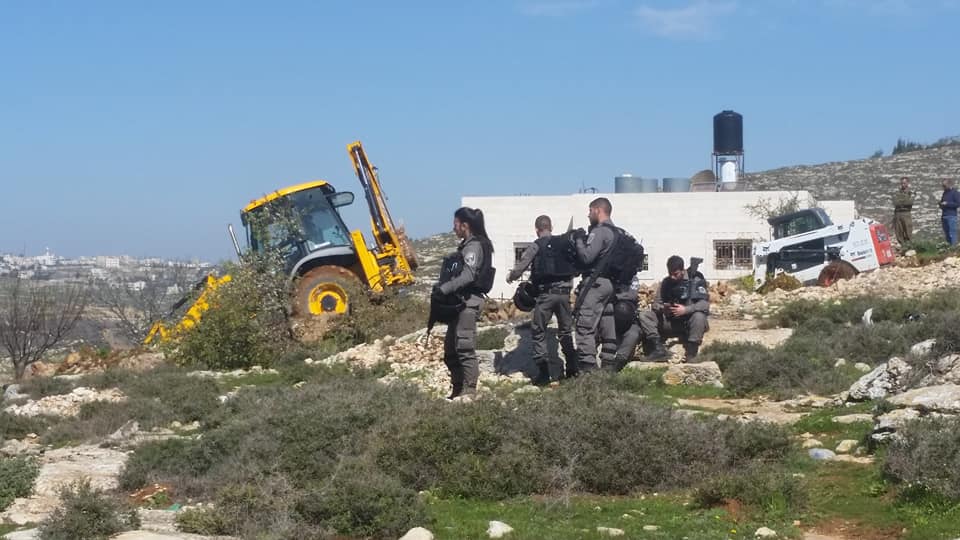
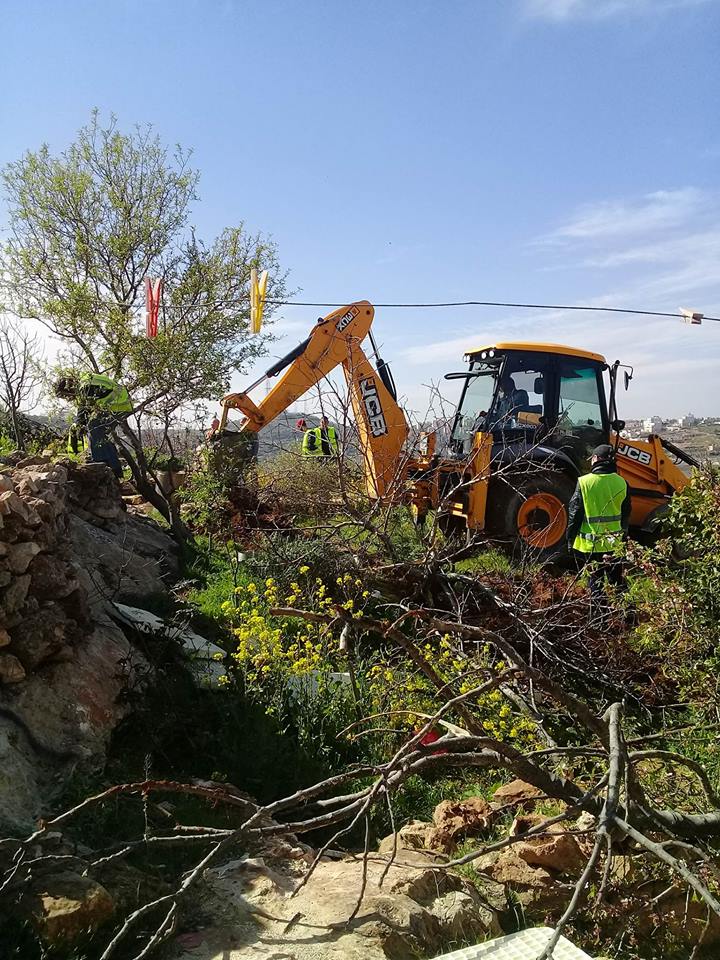
Both pictures are of bulldozers on the Jaber family land 21 Feb 2018, pictures by the Israeli Committee Against House demolitions
He points out the place where terraces, vines, and olive, almond and fig trees were bulldozed by the occupation forces, and shows us a line which the Israeli Civil Administration painted, demarcating the point beyond which it is illegal to build or plant crops or trees.
Atta shows us the spot where his apple tree was bulldozed. “When it had fruit, everyone called round to take some apples. When everyone’s bellies were full, there would still be enough apples left to fill buckets and sell them at the market. It was a gift from God.”
As well as pointing out the destruction, he takes obvious pleasure in proudly showing us the plants and trees which still remain after the attack. He points to some sage plants telling us, “this is good for digestive pain: there’s no need for tablets.”
Atta shows us some trees lower down the terraces which were bulldozed in February, but survived and have been replanted. He says, “these trees are saying ‘we want to be here’. They are fighting back.”
We walk on. “This tree is very sad,” Atta says. “Look, you can see. She used to be very green and full but after the others were destroyed she was sad to lose them.”
He explains to us that the family’s livelihood has been completely destroyed.
“My wife worked hard on the land and planted two or three acres. She woke every day at 5am and watered the crops. When the demolition happened she lost everything. She was the one who harvested the fruit and vegetables. I just sold them in the market. It has cost her 18 years of work. We had cauliflower, zucchini and eggplants. We didn’t need to buy vegetables, we grew it here. Now we have to buy them in the market.
“They bulldozed the rain water cistern too. And they threw some of the trees in it so we couldn’t retrieve them.”
Atta tells us that the Israeli water company Mekorot has refused to connect the house to its water lines, despite the fact that they run close by. “Our water comes from rain water, most of it. The occupation’s message is that we must be thirsty all our lives.”
The Civil Administration says that this is Israeli state land, and that the family should not build any new structures here, or renovate any old ones. The Jaber family’s land lies in ‘Area C’ of the West Bank. Under the Oslo agreement of 1993, the West Bank was divided into three zones of control, ‘Area A’ was supposed to be under Palestinian control, ‘Area B’ jointly controlled and ‘Area C’ under only Israeli jurisdiction. The agreement was supposed to be an interim measure until the creation of a Palestinian state which would take control of all three areas, save for any areas which were subject to future agreements between the parties.
Of course, the agreement never progressed to the next stage, but 25 years later the Israeli state is still twisting the interim measures to its advantage. State policy is to stamp out Palestinian livelihoods and communities in Area C, and give the land to the expanding Israeli settlements. Palestinians are barred from building any new structures in Area C, and this is enforced by demolitions, which occur at a rate of approximately 450-1000 per year. According to the UN, Israel demolished 1094 Palestinian structures in 2016, and 425 in 2017.
In this latest demolition, occupation forces destroyed ancient terraces which, even under the occupation’s own discriminatory regulations, should have been left alone, as they were built before the occupation of the West Bank in 1967.
Since the ‘90s, the Jaber family has experienced several demolitions, as well as continual harrassment by Israeli settlers. The first demolition of the Jaber home was in 1996, when Israeli forces and Civil Administration bulldozed the terracing around the house and arrested Atta for ten days. They came back again in 1998 and bulldozed two houses and more land. “I was arrested again, along with my son,” Atta explains. “I was kept for 12 days and beaten. They injured my leg and look, it is still damaged.”
Atta was forced to move to the old city of Hebron. But in 2000 Israeli activists from the Israeli Committee Against House Demolitions (ICAHD) helped the family to obtain a permit, and raised money to rebuild their home. The family and the activists called it the ‘Peace and Love House’. He tells us that there are many Israeli activists who are supporting the family. “People are not to blame for their governments,” he says.
In June 2000, settlers attacked the house twice and in December of the same year they occupied it. Atta says, “I went to the court and got the settlers to leave the house.”
There were regular settler attacks on the family’s home right up until 2014, and even now the family is still worried about attacks. That evening the family are invited to a wedding. Atta tells us, “One of us has to be in the house, protecting it because of the settlers. Even to go and share in people’s happiness we must do shifts staying here, because maybe the settlers or the Civil Administration will come...Every day we face harassment. The settlement is expanding: it has already taken 90% our land. This is Palestinian land but we have to face the Israeli occupation every day. But how can we fight with empty hands?”
Atta talks to us about the effect of the demolitions and settler violence on his daughters and sons:
“The children grew up in this situation, watching the settlers attack. They have seen the demolitions. After our houses were demolished for the first time in 1998, we had to live in a tent for the whole summer and winter. My oldest daughter wanted to hang herself from the fig tree when she was 5 years old because she didn’t have a home.”
Atta’s family has been on this land since long before the Israeli occupation. He tells us that his is the eighth generation of his family, living and working on this land. “We’re the second biggest family in Hebron district. I’m 55 years old, and I’ve spent 18 years working on this land – me and my wife and my kids.”
We ask him if he will continue to challenge the ongoing demolitions on his land in court Atta tells us that he will, but is sceptical about ‘justice’ from the Israeli courts, and about the way the Israeli state uses agreements with the Palestinians. He tells us:
How many agreements have there been from 1993 until now? The Israelis promise that they won’t demolish houses and expand the settlements. But what do we get from these promises? Nothing. We just lose more and more land. They don’t stop expanding the settlements. They don’t release our prisoners. The Civil Administration don’t want us here. It’s not just this area that they attack and destroy. They don’t want Palestinians in the whole of the West Bank. That’s the purpose of the occupation.
25 years of demolitions have made us feel very sick. But we have patience and we have hope and we must continue our lives. It’s not just us that are affected: this is the situation for 90% of people living in Area C.”
We ask Atta and the family whether they think that JCB and Bobcat, and other companies like them, share the responsibility for the demolitions. Atta replies, “Yes, they share the responsibility. The Israeli government hires from these private companies. The army uses heavy [military] bulldozers on the borders. The Civil Administration rents smaller bulldozer from private companies too. The companies are making a lot of money from the demolitions.”
Atta explains that private companies should be using their equipment to benefit the world:
“We have poor people, hungry people, sick people without homes. We can’t exist here in the villages without water. Equipment from companies like JCB and Bobcat could be used for agriculture or for connecting water pipes. Instead of bulldozing homes, homes could be rebuilt for the people. Why are schools being demolished in villages? Maybe one of those students would have become a doctor and discovered the cure for cancer. Why don’t these companies build universities for poor students? Companies should work for humanity.”
You can read more about the Jaber family at:
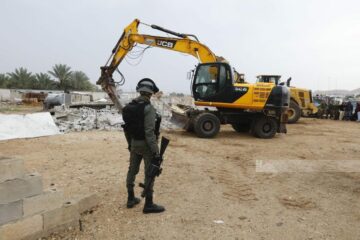
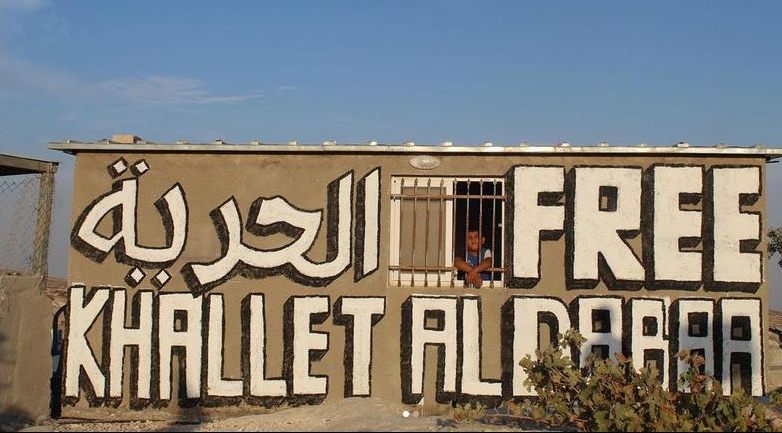
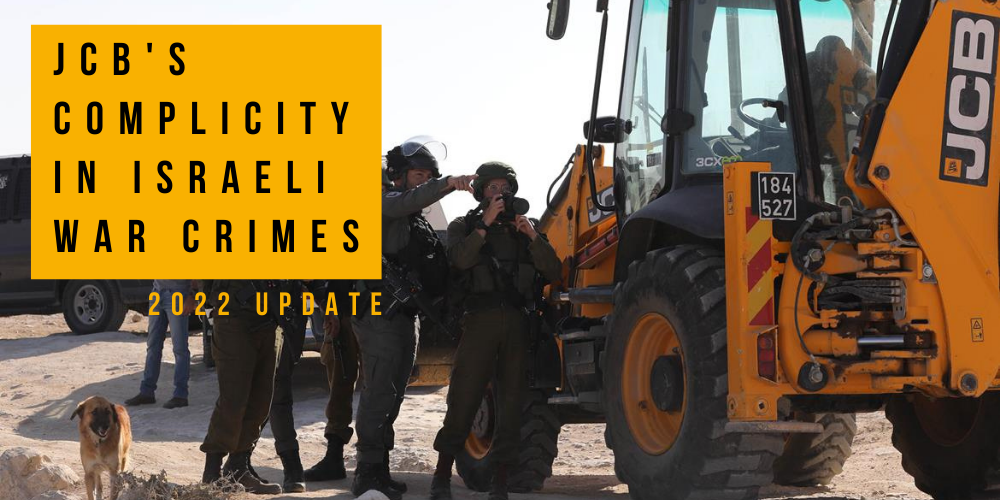
0 Comments